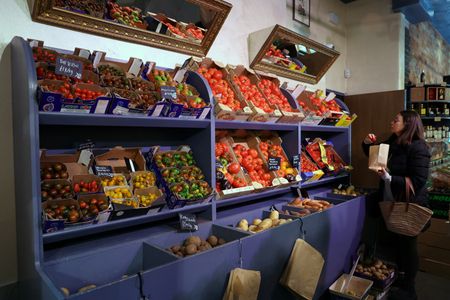LONDON (Reuters) -British producer output price inflation rose to a two-year high of 1.9% in June, up from 1.3% in May, according to preliminary official data which adds to signs of inflationary pressures facing the British economy.
Britain’s Office for National Statistics suspended the publication of PPI data in March after discovering calculation errors dating back to 2020. Wednesday’s figures represent interim data before regular publication resumes in October.
In July, the ONS said initial analysis showed that producer price inflation in previous years had been higher than originally calculated.
Wednesday’s figures showed further upward revisions, with a previously reported 0.5% producer output price inflation rate for the year to April revised up to 0.7%. However, the ONS said the overall changes were in line with its previous expectations.
Producer input prices in the year to June were down by 1.0% in the year to June after a similar decline in May, which the ONS said was driven by a 24.1% annual drop in the cost of crude oil and natural gas.
Producer prices data is used by economists including those at the Bank of England to judge the strength of underlying inflationary pressures in the economy and their likely impact on consumer prices.
British CPI rose to an 18-month high of 3.8% in July – the highest among major advanced economies – and the Bank of England forecasts it will reach 4% in September.
PPI data is also used for inflation adjustments in British gross domestic product, trade and construction statistics. The ONS said it expected the impact of the changes on published GDP data for 2025 to be “negligible”.
(Reporting by David Milliken; Editing by William Schomberg)











